Akon's Con Job
The platinum-selling R&B artist has fabricated a past as ringleader of a "notorious" car theft ring who spent 4 1/2 years in jail.

View Document
Akon - New Jersey Indictment
-
Akon - New Jersey Indictment
-
Akon - New Jersey Indictment
-
Akon - New Jersey Indictment
-
Akon - New Jersey Indictment
APRIL 16--In the hip-hop world, a performer's street cred can often be gauged by the number of entries on their rap sheet, the time they have spent behind bars, or the gritty details of their illicit escapades.
 By any of those metrics, the chart-topping R&B singer Akon appears to have compiled an exemplary outlaw resume, one brimming with scrapes from a hard knock life.
By any of those metrics, the chart-topping R&B singer Akon appears to have compiled an exemplary outlaw resume, one brimming with scrapes from a hard knock life.
As recounted in scores of interviews since his first album, the platinum-selling "Trouble," debuted in 2004, Akon was incarcerated for a total of four-and-a-half years, including a long stretch for his role as the "ringleader of a notorious car theft operation." Akon's gang specialized in boosting Porsches, Lamborghinis, and Mercedeses, he owned four chop shops catering to "celebrities and drug dealers," and he frequently escaped from cops in high-speed pursuits. His criminal empire collapsed, though, after underlings--who "felt like they deserved more than they were getting"--cut deals and ratted him out to law enforcement. As a result of that betrayal, Akon spent the next three years in a Georgia prison. While inside, the 150-pound inmate "fought almost every day for two years," in the process becoming a "champion" who prevailed over both big and small inmates because, "I knew where to hit you to knock you out, so I didn't fear you."
When not brutally schooling fellow convicts, Akon was writing songs, including "Locked Up," his autobiographical account of prison desolation, from dwindling commissary accounts to friends and family that no longer visited or accepted collect calls. The song, he recalled, "was like an anthem in there" and corrections officers would often ask him to sing its chorus ("I'm locked up/They won't let me out"). After his release in 2002, Akon recorded "Locked Up," adding to the song what would become his audio trademark: the clanging sound of a cell door closing. The single later became a hit, but did little to erase the memories of his time on lockdown, which "felt like 300 years, not three."
 Compared to most of hip-hop's leading figures past and present--50 Cent, Snoop Dogg, Eminem, Diddy, Tupac Shakur, Jay-Z, Notorious B.I.G.--Akon, 35, seems to have logged more time behind bars and, consequently, gained a better understanding of the average convict's plight (both in and out of custody) than any of his musical peers. The New York Times has referred to him as the "prison-obsessed R&B singer" who "wants it known that crooners can evoke prison life just as effectively as rappers." In fact, the singer not only named his company Konvict Music, but he settled on "Konvicted" for the title of his second album, which sold nearly three million copies last year.
Compared to most of hip-hop's leading figures past and present--50 Cent, Snoop Dogg, Eminem, Diddy, Tupac Shakur, Jay-Z, Notorious B.I.G.--Akon, 35, seems to have logged more time behind bars and, consequently, gained a better understanding of the average convict's plight (both in and out of custody) than any of his musical peers. The New York Times has referred to him as the "prison-obsessed R&B singer" who "wants it known that crooners can evoke prison life just as effectively as rappers." In fact, the singer not only named his company Konvict Music, but he settled on "Konvicted" for the title of his second album, which sold nearly three million copies last year.
As it turns out, however, "Kontrived" might have been a more accurate choice.
Akon's ad nauseum claims about his criminal career and resulting prison time have been, to an overwhelming extent, exaggerated, embellished, or wholly fabricated, an investigation by The Smoking Gun has revealed. Police, court, and corrections records reveal that the entertainer has created a fictionalized backstory that serves as the narrative anchor for his recorded tales of isolation, violence, woe, and regret. Akon has overdubbed his biography with the kind of grit and menace that he apparently believes music consumers desire from their hip-hop stars.
While the performer's rap sheet does include a half-dozen arrests, Akon has only been convicted of one felony, for gun possession. That 1998 New Jersey case ended with a guilty plea, for which the singer was sentenced to three years probation. Another 1998 bust, this one in suburban Atlanta, has been seized upon by Akon and transformed into the big case that purportedly sent him to prison (thanks to his snitching cohorts) for three fight-filled years. In reality, Akon was arrested for possession of a single stolen BMW and held in the DeKalb County jail for several months before prosecutors dropped all charges against him.
So there was no conviction. There was no prison term between 1999 and 2002. And he was never "facing 75 years," as the singer claimed in one videotaped interview.
Akon's invented tales appear to be part of a cynical marketing plan, but one that has met with remarkable success. Few press interviews conclude without Akon being asked about his criminal exploits and his prison days. He obliges with canned and well-rehearsed claims, false as they may be, and compares his supposed nationwide operation to those depicted in the movies "Gone in 60 Seconds" and "New Jersey Drive." And in interview after interview over the years, he always makes sure to point out the "notorious" nature of his theft ring (as if the adjective's inclusion makes him sound even more felonious). Akon repeats the phrase "notorious car theft operation" so frequently it seems like he is reading it from a sheet of talking points.
[A compilation of video clips in which Akon touts his purported criminal past may be viewed above.]
Akon's manager, Robert Carnes, declined to discuss any aspect of the criminal history of the R&B singer, who is currently touring in Africa. Carnes directed a reporter to Sharonda Smalls, Akon's publicist at Universal Motown Records. After being apprised of the nature of TSG's story, Smalls said she would seek replies to our questions, but had not called back at press time. Darrick "Devyne" Stephens, Akon's longtime collaborator and business partner, did not return several messages left at his Atlanta office.
Akon's deceptions have gone unchallenged and unexamined by the music press, which has been happy to promote him as one of the beleaguered recording industry's few bright lights. He was named "Top Artist of 2007" by Billboard and dubbed "The Last Hit-Maker" in an April 2007 Vibe cover story. His two albums combined have sold about 10 million copies worldwide, while ring tone sales have exceeded 6.5 million downloads. He has also collaborated on songs with a wide array of musical superstars, including Gwen Stefani, Eminem, Michael Jackson, and Whitney Houston.
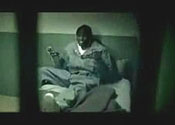 With the single exception of a Washington Post reporter who wrote last March that some of the "bullet points in Akon's biography" sounded "like the stuff of creation myth," entertainment journalists have played right into the manipulation. In a February 2007 story in Creative Loafing, Atlanta's weekly newspaper, readers were assured that "Akon doesn't need to embellish, since he's already lived an unusual and turbulent life." And an August 2007 Interview magazine story was headlined, "Akon: In a hip-hop world where everyone's always straining for street cred, here's one guy who has it."
With the single exception of a Washington Post reporter who wrote last March that some of the "bullet points in Akon's biography" sounded "like the stuff of creation myth," entertainment journalists have played right into the manipulation. In a February 2007 story in Creative Loafing, Atlanta's weekly newspaper, readers were assured that "Akon doesn't need to embellish, since he's already lived an unusual and turbulent life." And an August 2007 Interview magazine story was headlined, "Akon: In a hip-hop world where everyone's always straining for street cred, here's one guy who has it."
For his part, the performer appears so confident that nobody will challenge his fables that he has recently embellished them even further. In an interview for a February 2008 episode of VH1's "Rags to Riches," the R&B performer claimed that he actually was a carjacker who "used to literally snatch cars from people. And they would be traumatized for months." He claimed to be ashamed of this behavior (which he never previously mentioned) and remarked that he could not believe he once "had the heart to do that stuff." A VH1 graphic duly noted that this wanton activity "landed him three years in prison for carjacking."
This m.o., of course, might seem familiar to readers of these pages. An artist inflates his criminal history to create an image of himself as a public menace who tangles with law enforcement and pays for his transgressions with a stiff prison sentence. He cleaves to these bogus biographical details in public appearances and media interviews and carefully weaves them into the art he peddles to the public. Because without the embellishments and fabrications, without the havoc and heartache, what separates him from every other wannabe clawing for commercial success? Why chance having your work judged solely on its merits when a little artistic license can make you so much more distinctive and marketable?
Akon, as it turns out, is James Frey with catchy hooks and an American Music Award.
* * *
 TSG began examining Akon's criminal record after he was arraigned last December on criminal charges stemming from an incident during a June 2007 concert at Dutchess Stadium in Fishkill, N.Y.. During that show, Akon, whose given name is Aliaune Thiam, lifted a 15-year-old boy over his head and tossed the child into the crowd. As seen on a popular YouTube video, Akon dispatched a security guard to bring the young fan, Anthony Smith, on stage after a pretzel had been thrown at him from the audience (fellow concertgoers apparently fingered the teenager as the culprit). "He made a big mistake today, boy," Akon announced before flinging Smith several rows into the crowd.
TSG began examining Akon's criminal record after he was arraigned last December on criminal charges stemming from an incident during a June 2007 concert at Dutchess Stadium in Fishkill, N.Y.. During that show, Akon, whose given name is Aliaune Thiam, lifted a 15-year-old boy over his head and tossed the child into the crowd. As seen on a popular YouTube video, Akon dispatched a security guard to bring the young fan, Anthony Smith, on stage after a pretzel had been thrown at him from the audience (fellow concertgoers apparently fingered the teenager as the culprit). "He made a big mistake today, boy," Akon announced before flinging Smith several rows into the crowd.
With the incident on tape, the singer was charged with harassment and endangering the welfare of a child. Following a December 3 court appearance, Akon was released without bail after a computer check turned up no outstanding warrants or, for that matter, any prior criminal history. This seemed peculiar considering the singer's frequent mentions of his prison time and assorted arrests.
 A second check was performed, with investigators submitting Akon's fingerprints to the FBI for a more thorough search for warrants and priors. This time, bureau records turned up six arrests for Akon, who previously used several aliases and birthdates when being processed by law enforcement agencies in New Jersey and Georgia. In light of the discovery of the previous arrest history, prosecutors asked a town judge to set Akon's bail at a nominal $5000, a request the jurist denied.
A second check was performed, with investigators submitting Akon's fingerprints to the FBI for a more thorough search for warrants and priors. This time, bureau records turned up six arrests for Akon, who previously used several aliases and birthdates when being processed by law enforcement agencies in New Jersey and Georgia. In light of the discovery of the previous arrest history, prosecutors asked a town judge to set Akon's bail at a nominal $5000, a request the jurist denied.
Though he has claimed to have been frequently arrested while growing up in a middle class household in New Jersey, Akon's rap sheet (and court records) reflect no such cases. He told Vibe last year that he sold marijuana and test questions from his high school locker and that a friend named Tito got him his first gun, a .22. Which, Akon claimed, he rented out for $100 a day. As he explained to VH1 in 2005, he was a big deal back then: "I got accepted by the gangster crowd because they saw that I wasn't afraid of nobody and I would fight anybody...Before I knew it, I became the most popular kid in Jersey City as a good bad guy." Though he lived in the suburbs, Akon told Vibe he "hung out in the ghetto. The suburbs were just boring. We couldn't make any noise."
 Born in Missouri, Akon reportedly spent some of his youth is Senegal, where his father, Mor Thiam, was a well-known percussionist. Akon apparently moved with his family to Georgia in the mid-90s, though he would often return to New Jersey, where he hung out with members and associates of the Fugees. At the time, the singer was signed to Elektra Records and was, according to copyright records, writing songs with Fugee Wyclef Jean and Stephens, a choreographer and "image consultant" who would later play a central role in Akon's platinum success.
Born in Missouri, Akon reportedly spent some of his youth is Senegal, where his father, Mor Thiam, was a well-known percussionist. Akon apparently moved with his family to Georgia in the mid-90s, though he would often return to New Jersey, where he hung out with members and associates of the Fugees. At the time, the singer was signed to Elektra Records and was, according to copyright records, writing songs with Fugee Wyclef Jean and Stephens, a choreographer and "image consultant" who would later play a central role in Akon's platinum success.
It was after his deal with Elektra cratered that Akon ran into his first serious criminal trouble. In September 1998, he was named in a felony indictment charging him and codefendant Terrence Taylor with handgun possession and receiving stolen property (specifically, a 1998 BMW).
Burlington County Superior Court records indicate that Akon--who was originally charged under the name Abou Thiam--was released from the county lockup in Mount Holly after posting $3500 bond.
While free on the New Jersey case, he was arrested in mid-November 1998 in Stone Mountain, Georgia. According to a police report, a DeKalb County auto crime investigator happened to be on a stakeout when Akon had the misfortune to drive past him. It probably didn't help that, as the police report notes, Detective R.L. Brewer "observed a white BMW vehicle being driven by a B/M subject." During a prior court case, Akon listed a home address in Stone Mountain that was slightly more than a mile away from where Brewer spotted him.
 In a TSG interview, Brewer recalled that he was positioned outside a shopping center and that his stakeout had nothing to do with Akon; the singer was just in the wrong place at the wrong time. The performer happened to be driving a car whose license plates triggered a "stolen vehicle response" when the auto's tags were typed into a police computer. Brewer followed Akon until two uniformed backup officers arrived and pulled over the BMW 740 near Highway 78, according to a police report. He was taken into custody "without incident." A passenger, Willie Ashley, was detained on unrelated traffic charges.
In a TSG interview, Brewer recalled that he was positioned outside a shopping center and that his stakeout had nothing to do with Akon; the singer was just in the wrong place at the wrong time. The performer happened to be driving a car whose license plates triggered a "stolen vehicle response" when the auto's tags were typed into a police computer. Brewer followed Akon until two uniformed backup officers arrived and pulled over the BMW 740 near Highway 78, according to a police report. He was taken into custody "without incident." A passenger, Willie Ashley, was detained on unrelated traffic charges.
[Years later, as he recounted his purported "ringleader" arrest in an interview for a DVD, Akon said that he was "going up 78 headed toward DeKalb" when he was surrounded by police cars. With their weapons drawn, officers began simultaneously barking at him to get out of his car. One cop, the singer recalled, remarked that, "You was caught in a car once before and they said it was a hot pursuit or something. But your name popped up in the computer." So, the singer added, "He locked me up." The arrest left the imaginary kingpin perplexed and wondering if he had been framed by someone who "planted something," since he knew how "clean" his work was.]
[In a November 2006 Rolling Stone interview, Akon took a similar fact-free flight of fancy, claiming that he was "driving a BMW 325, on my way to the chop shop" when he was apprehended. "That's the slowest car in the whole fleet...I'd been in high-speed pursuits before and always got away, but this time I didn't because the car was too slow. I didn't even want that car, it was a favor to someone else. And I wound up getting locked up for three years."]
 While searching the BMW, Brewer discovered title and registration documents purporting to show that Akon was the rightful owner of the $70,000 vehicle. But the detective believed the paperwork was fraudulent and called in FBI Agent Peter McFarlane for a consultation. McFarlane, who has worked auto crime cases in Atlanta since 1972, examined the documents and concluded that the title papers were bogus.
While searching the BMW, Brewer discovered title and registration documents purporting to show that Akon was the rightful owner of the $70,000 vehicle. But the detective believed the paperwork was fraudulent and called in FBI Agent Peter McFarlane for a consultation. McFarlane, who has worked auto crime cases in Atlanta since 1972, examined the documents and concluded that the title papers were bogus.
Brewer obtained warrants charging Akon with possession of stolen property, forgery, and possession of an auto with an altered vehicle identification number. The singer was booked into the DeKalb County Jail, where bond was set at $20,000 (an amount Akon could not raise).
 Nearly a decade after the arrest, McFarlane, who retired from the FBI in late-2002 after 31 years, could still recall some details of the case, due to one memorable fact regarding the BMW's theft in August 1998.
Nearly a decade after the arrest, McFarlane, who retired from the FBI in late-2002 after 31 years, could still recall some details of the case, due to one memorable fact regarding the BMW's theft in August 1998.
Three months before Akon was arrested driving the car, the vehicle had been stolen from in front of the Columbus, Georgia office of Robert Schiffman, a wealthy financier. Schiffman also was a collector of valuable guitars, one of which happened to be in the trunk of the sedan when it was taken. The car thieves, though, were unaware that the instrument, a 1931 Herman Hauser that once belonged to the classical guitar virtuoso Andres Segovia, was worth more than the BMW itself. The guitar, then valued at $100,000, was one of only two instruments that Hauser built for Segovia (the other guitar, made in 1937, is part of The Metropolitan Museum of Art's collection).
Along with everything else in the car that could trace back to the BMW's owner, the guitar was discarded by the thieves. The instrument, still in its $1200 case, was eventually discovered in a roadside bush by a BellSouth lineman. Five years later, the Hauser guitar finally found its way back to Schiffman, who is now seeking to sell the guitar for upwards of $250,000.
McFarlane, 62, who has worked auto crime cases for Georgia's Department of Revenue since his FBI retirement, laughed out loud when told of Akon's claims about running a "notorious" auto theft ring, owning chop shops, and being brought down by turncoat underlings. "Ah, this is bullshit. This guy is so phony. He's an arrogant SOB," said McFarlane. Asked about Akon, Brewer said, "I don't think he had any role besides [wanting] to drive a high-dollar vehicle. And I say this because we didn't link him to any other cars."
Nobody was arrested for the actual theft of the BMW, and it is unclear how Akon obtained the auto. Though both McFarlane and Brewer recalled how a member of Jagged Edge, an Atlanta-based R&B group, opted to purchase stolen cars at a deep discount.
 Either way, the felony case against Akon was dropped in its entirety in late-April 1999. He spent five months in jail before prosecutors decided not to make a grand jury presentment. The singer was immediately sprung from the DeKalb jail, departing at 1:27 on a Wednesday morning, according to county records. Somehow, in the intervening years, those few months in custody morphed into three years in prison, the majority of Akon's purported total of four-and-a-half years behind bars.
Either way, the felony case against Akon was dropped in its entirety in late-April 1999. He spent five months in jail before prosecutors decided not to make a grand jury presentment. The singer was immediately sprung from the DeKalb jail, departing at 1:27 on a Wednesday morning, according to county records. Somehow, in the intervening years, those few months in custody morphed into three years in prison, the majority of Akon's purported total of four-and-a-half years behind bars.
In June 1999, Akon pleaded guilty in New Jersey to a weapons possession count. In return, Burlington County prosecutors agreed to drop a second felony charge stemming from the singer's possession of an allegedly hot car. He was later fined $1000 and sentenced to three months probation, the supervision of which was immediately transferred to Georgia, where Akon resided. In opting for a probationary--and not custodial--sentence, Judge Donald P. Gaydos noted that Akon had "no history of prior delinquency or criminal activity or has led a law-abiding life for a substantial period of time before the commission of the present offense."
Gaydos also concluded that Akon would likely "respond affirmatively to probationary treatment." This was an accurate prediction on the judge's part, as Georgia officials requested, in late-2001, that the performer's supervision be terminated early since he had been a model probationer. That request was granted by a New Jersey judge on September 20, 2001.
 Of course, this was during the exact period of time (1999-2002) that Akon claims he was imprisoned in Georgia for his supposed "Gone in 60 Seconds" handiwork. It was during that fabricated prison stretch, of course, that he supposedly wrote much of "Trouble," his first album. In that CD's liner notes, the acknowledgements end with this purposely vague salute: "Last but not least, thanks to the jailhouse in which I was confined--which made me a better, stronger and wiser man."
Of course, this was during the exact period of time (1999-2002) that Akon claims he was imprisoned in Georgia for his supposed "Gone in 60 Seconds" handiwork. It was during that fabricated prison stretch, of course, that he supposedly wrote much of "Trouble," his first album. In that CD's liner notes, the acknowledgements end with this purposely vague salute: "Last but not least, thanks to the jailhouse in which I was confined--which made me a better, stronger and wiser man."
The album's autobiographical centerpiece, "Locked Up," is Akon's lament about being warehoused and forgotten in prison, where "They won't let me out/They won't let me out." He never actually served those three years, so these observations lose a bit of their authoritativeness. Additionally, a check of United States Copyright Office records reveals that when Akon's publishing company registered the song they listed its "Date of Creation" as 2003. So "Locked Up" was not even created during the three-year period in which Akon was not even in prison.
And as if there needs to be further evidence to rebut the singer's claims about being imprisoned from 1999-2002, Akon's own son Tyler could serve as Exhibit A.
 According to a paternity action filed late last year in Fulton County, Georgia, the boy was born on July 26, 2001, which roughly puts his date of conception in late-October 2000 (again squarely in the middle of a prison term that Akon never served). As part of the amicable paternity action, the singer was ordered to pay the boy's mother, a former Alpha Delta Pi sorority girl at Eastern Kentucky University, $2795 in monthly child support.
According to a paternity action filed late last year in Fulton County, Georgia, the boy was born on July 26, 2001, which roughly puts his date of conception in late-October 2000 (again squarely in the middle of a prison term that Akon never served). As part of the amicable paternity action, the singer was ordered to pay the boy's mother, a former Alpha Delta Pi sorority girl at Eastern Kentucky University, $2795 in monthly child support.
Curiously, Superior Court filings in the paternity case--in which both sides appear to have been represented by the same attorney--list Akon's monthly gross income as a relatively paltry $15,900, or $190,800 annually (child support payments are based, in part, on this figure).
In reality, Akon likely makes 20 or 30 times that amount monthly via record sales and touring income. His Atlanta-area real estate portfolio alone is worth about $5 million. In January, he paid $1.65 million for an 8697-square-foot McMansion on 4.96 acres adjacent to the Atlanta National Golf Club. In February 2007, Akon and "Devyne" Stephens paid $2.65 million for a 13.29 acre Fulton County estate. Photos of the two sprawling properties can be seen below.
 Though it had been less than a year since the property was purchased (and despite the housing market being in distress, especially in the Atlanta area), Akon assured VH1 during a recent tour of the estate that his home was "already appraised for $25 million." Fittingly, the R&B star has dubbed his home "Dream Land."
Though it had been less than a year since the property was purchased (and despite the housing market being in distress, especially in the Atlanta area), Akon assured VH1 during a recent tour of the estate that his home was "already appraised for $25 million." Fittingly, the R&B star has dubbed his home "Dream Land."
He also told VH1 of his desire to house lions and tigers on the grounds and how he "flew in an African crocodile" that will live in a glass-enclosed chamber that can be peered into through a transparent panel on the home's ground floor. Oh, and near the indoor waterfall he is going to install a retractable stripper pole.
Which will come as no surprise to anyone who has listened to his albums. While his lilting, nasal voice and hooks are distinctive and contagious, Akon's lyrics are pedestrian and filled with standard-issue hip-hop boasts and references to strippers, bitches, girls "dropping it to the floor," and sex acts performed atop furniture. Women are said to be "looking bootylicious and jingling," and a worked-up Akon notes that he might even ask a gal if he could "bust all over your anatomy."
In "Smack That," Akon's Top Ten collaboration with Eminem, the R&B star sings of a possible romantic encounter:
Maybe go to my place and just kick it like Tae Bo
And possibly bend ya over/Look back and watch me smack that
All on the floor/Smack that
Give me some more/Smack that
Til you get sore/Smack that
Leonard Cohen he is not.
* * *
Akon is not the first performer to fudge some biographical details. But few artists have gone so far out of their way to aggressively promote these fabrications and embellishments (or you could just call them lies).
In hip-hop circles, being considered "real" is a requirement for success. Akon, on the other hand, couldn't be more fake. He's the music industry's phantom menace, a guy who, four years ago, cast himself as a crime kingpin and has happily played that fictitious role ever since. Really, why tinker with success? In fact, if the title is any indication, the singer's hotly anticipated third album, "Acquitted," promises more of the same when it is released later this year. According to an MTV report, Akon has even already recorded his fourth album, which he's calling "Double Jeopardy." What's next? "No True Bill?" "Pretrial Detention?"
During a Vibe interview last year, Akon eagerly repeated his phony stories of criminal entanglements, but balked when reporter Laura Checkoway asked about his age, which he has long sought to cloak. By all indications, he was born April 16, 1973, so birthday wishes are in order (though his first Copyright Office registration carried a 1972 year of birth). The singer explained to Checkoway that, "The only thing I hide is my age," adding, "Before I lie to you, I'd rather say nothing."
It was a rare moment of self-restraint from the serial fabulist, who offered one other bit of self-examination: "I always had a way of getting over on people, whether manipulating or conning them."


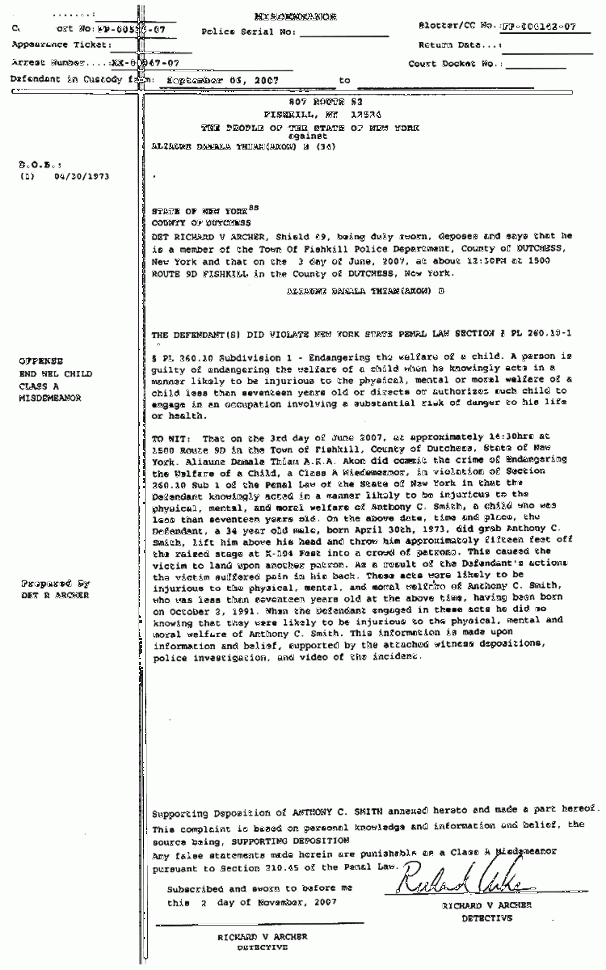

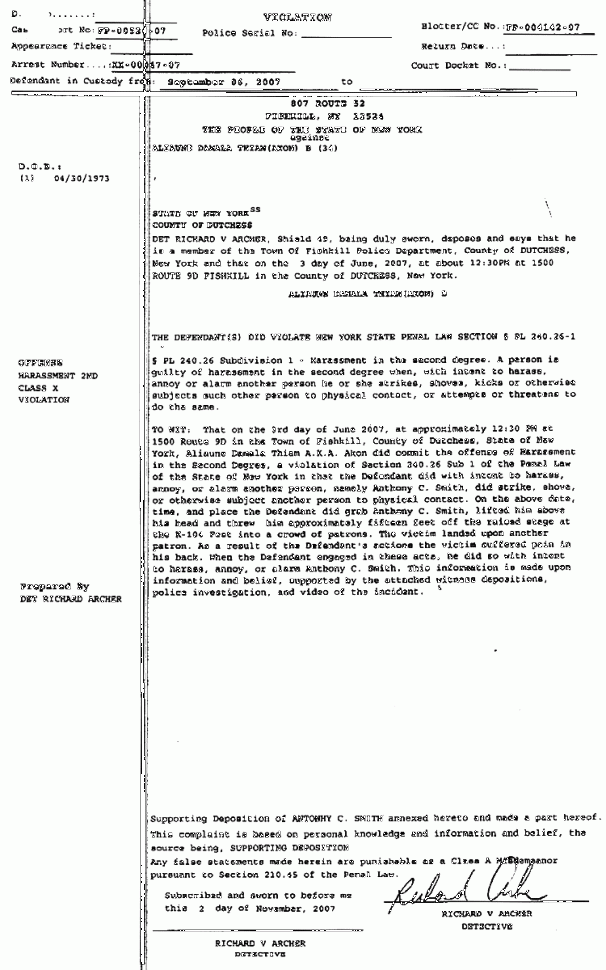



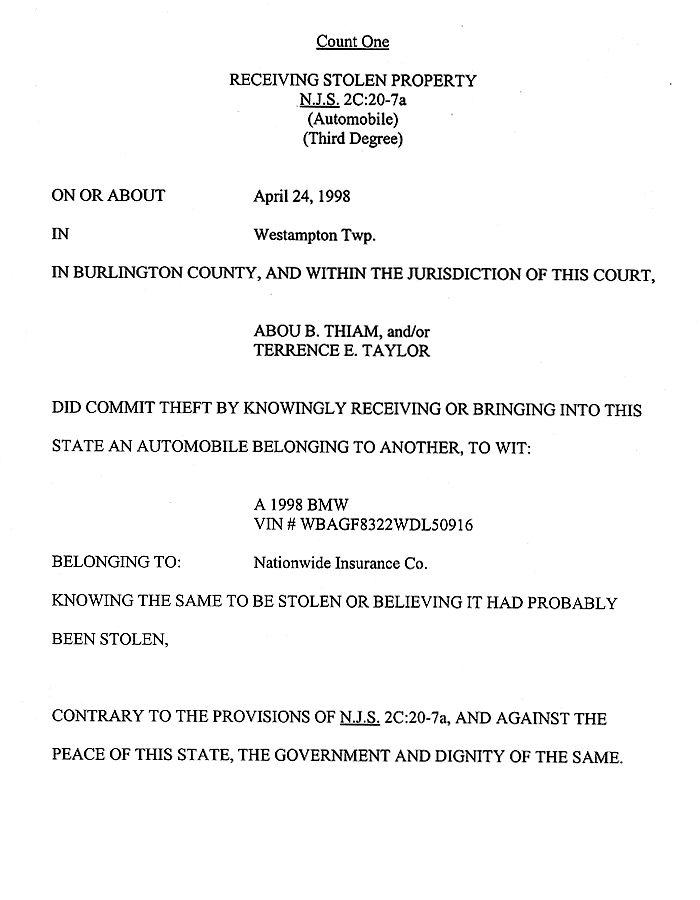

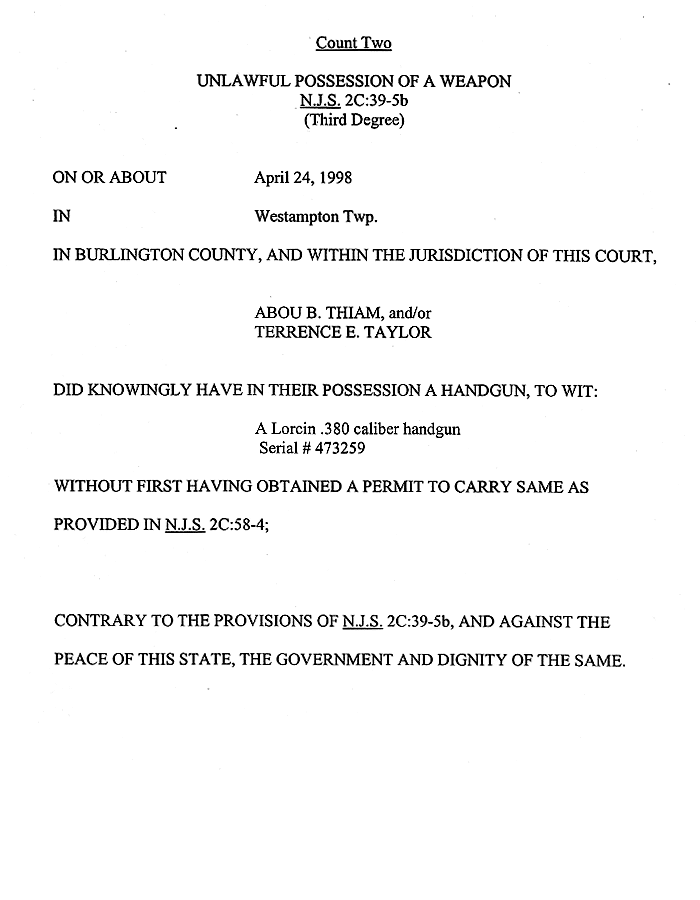

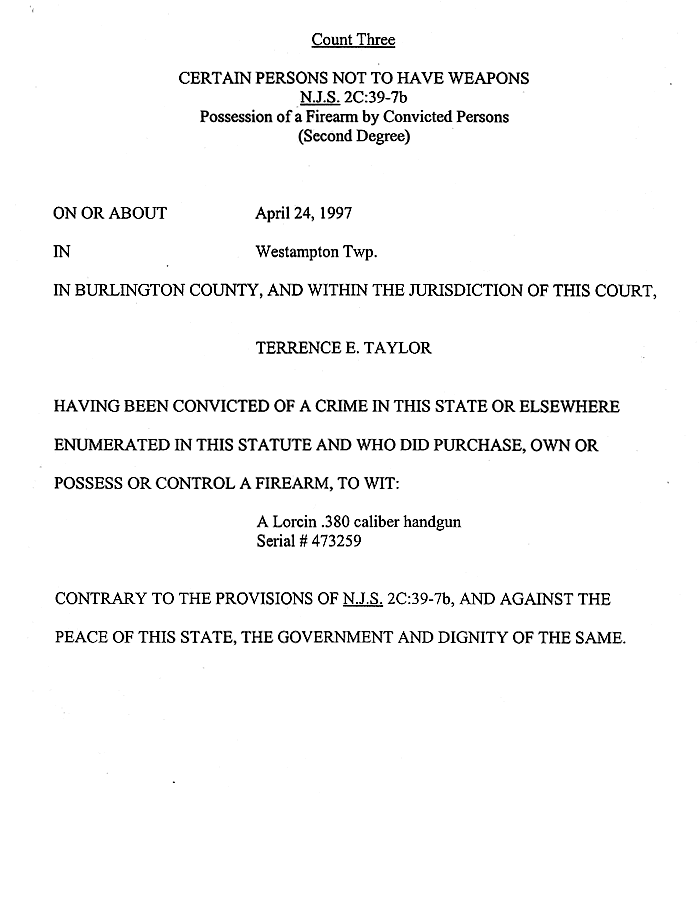

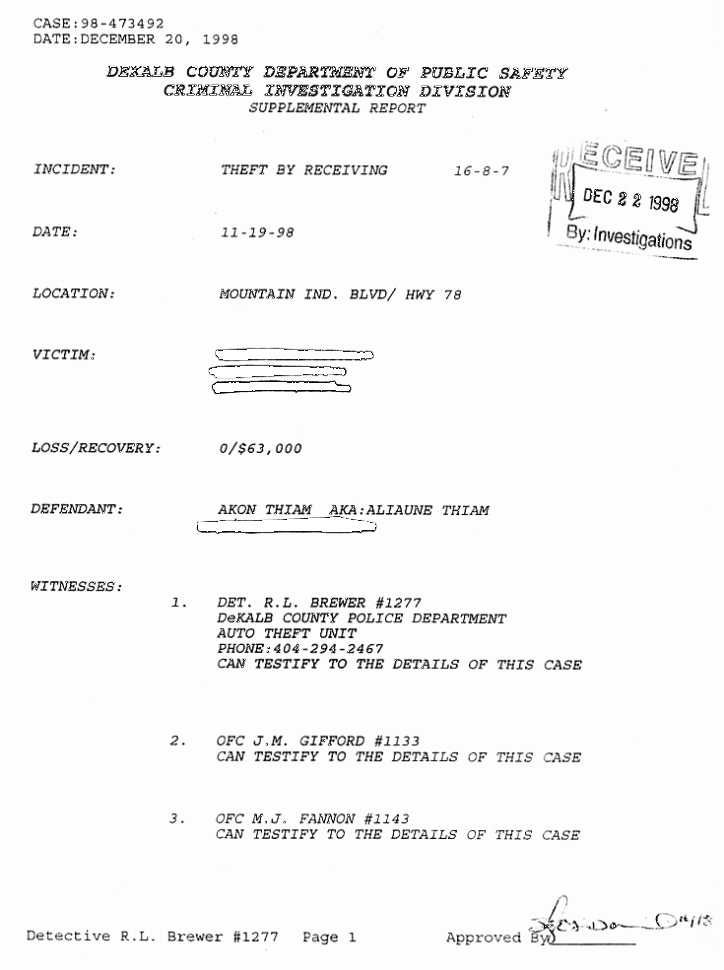

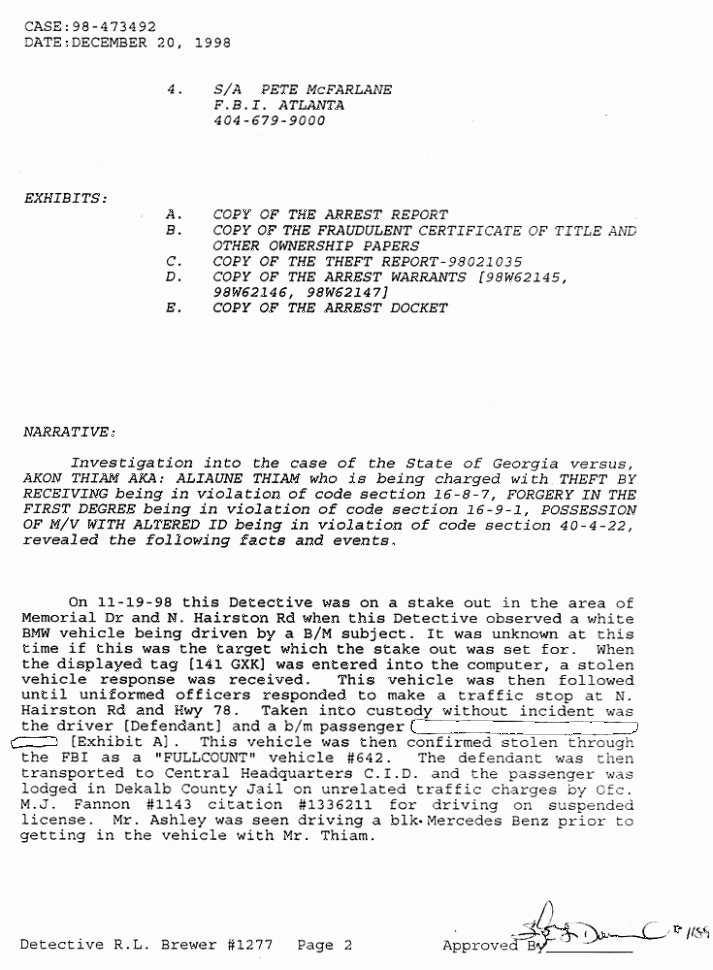

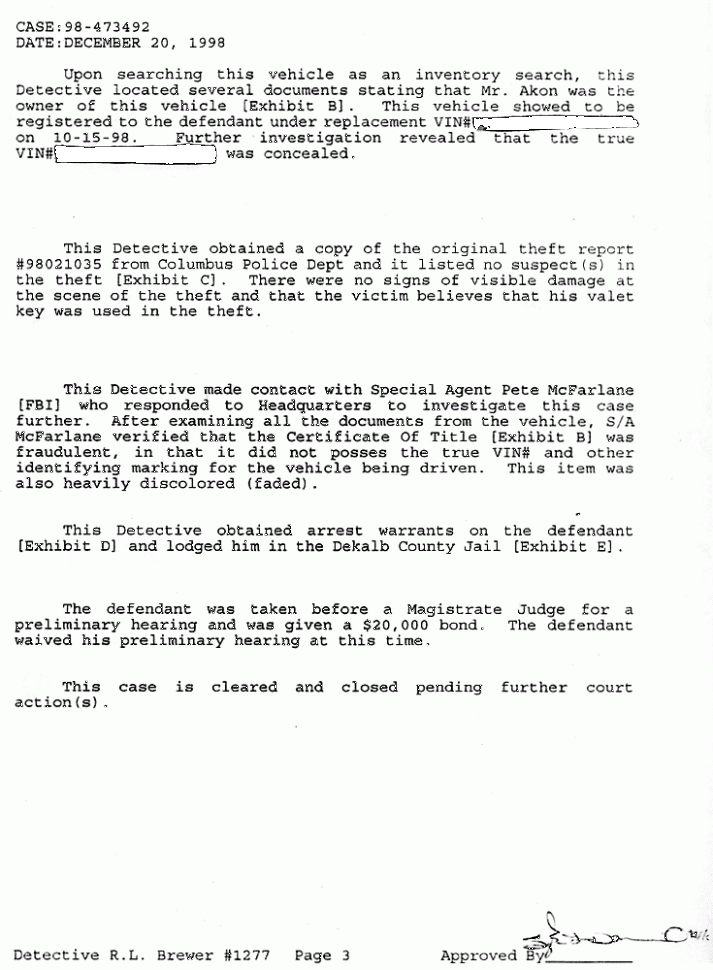





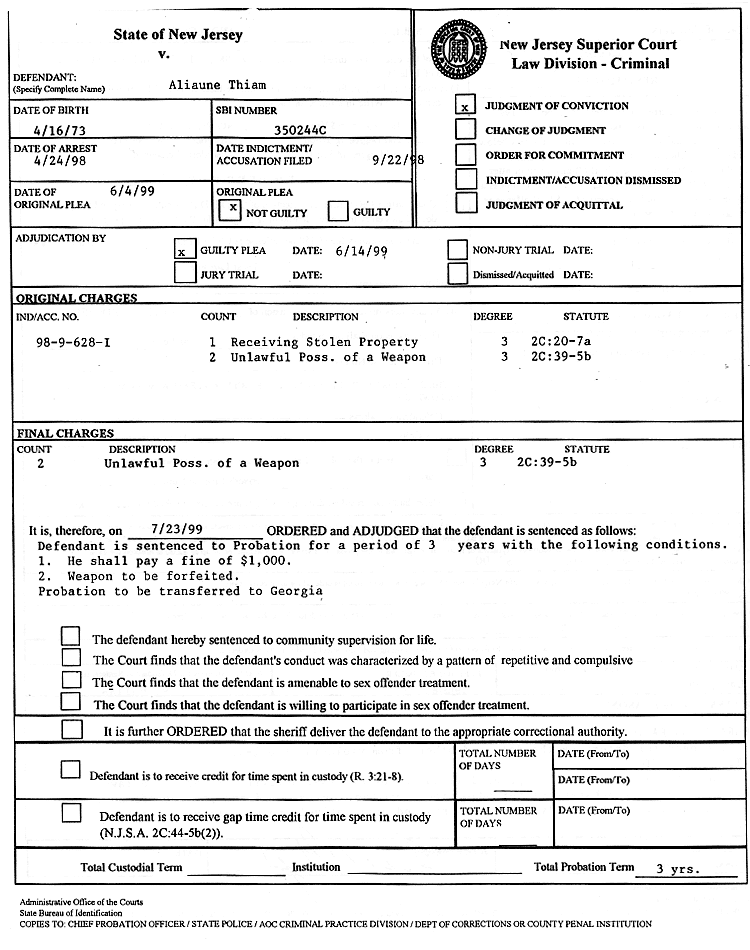

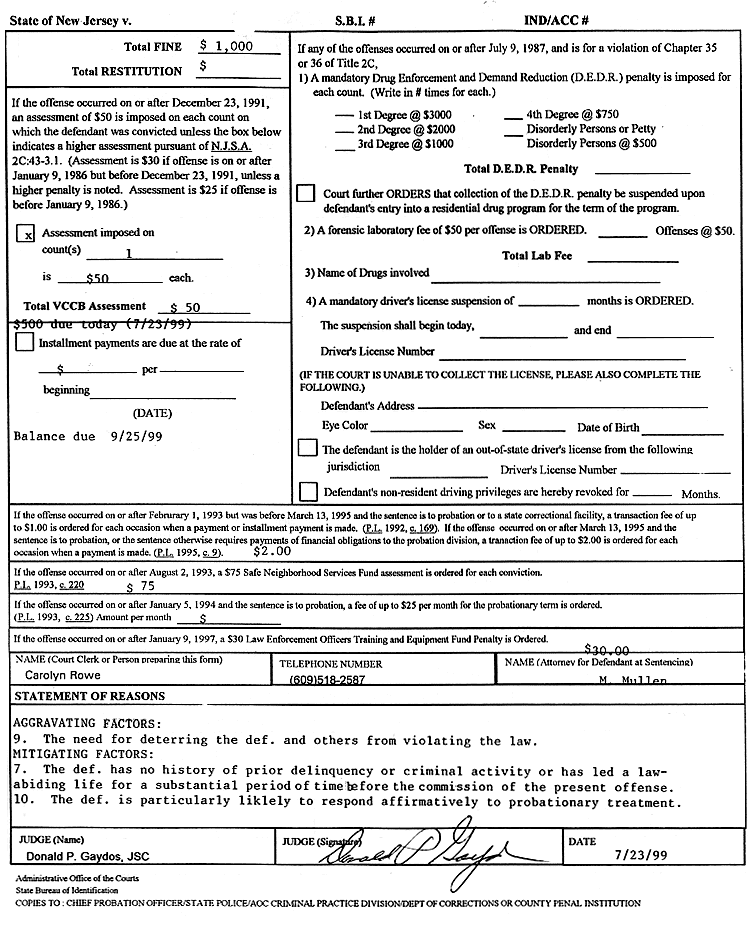

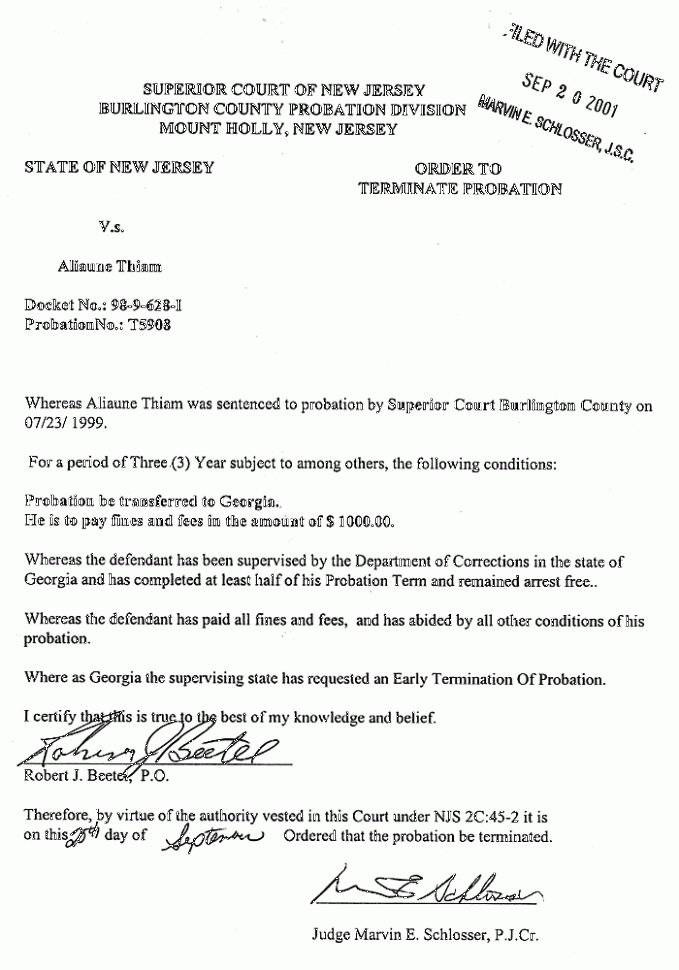



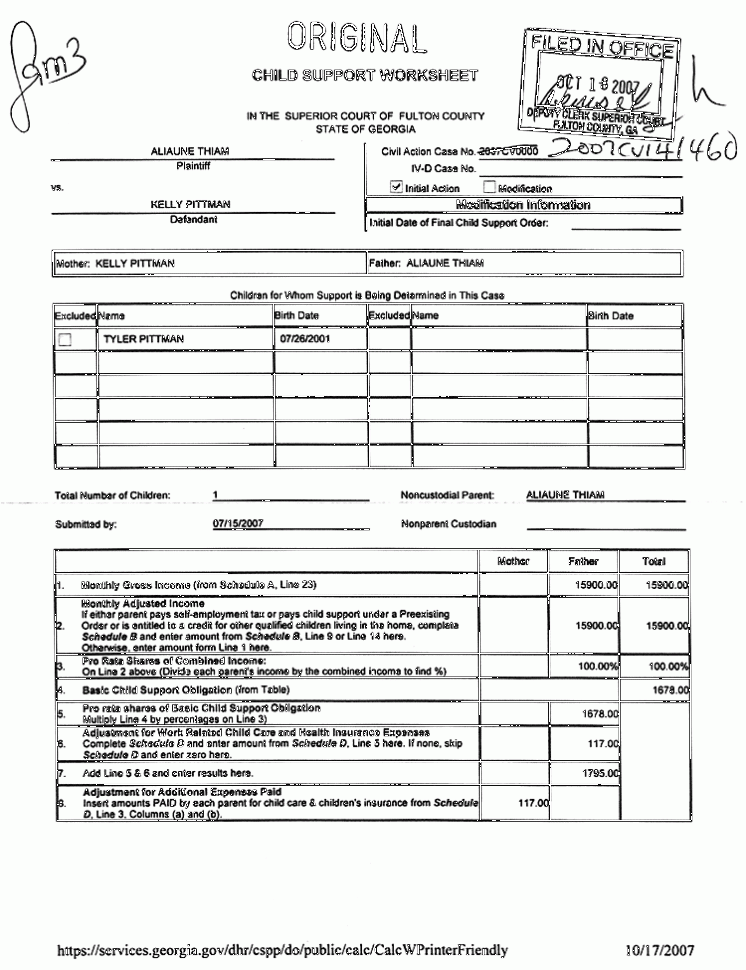

Comments (1)